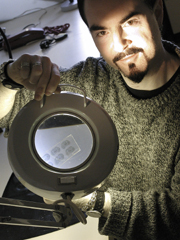
 |

|
|
 |
|
|
|||
 Psychology Professor Jim Pfaus Photo by Christian Fleury |
by Sigalit Hoffman Concordia Psychology Professor and researcher Jim Pfaus is riding the wave of his rapid rise to fame. “It was bigger than anything I ever expected,” said Pfaus, who is part of Concordia’s Centre for Studies in Behavioural Neurobiology (CSBN). Pfaus began receiving nationwide media attention two months ago after testing a new drug that may raise women’s sex drive. He believes it’s his duty to inform the public of his work. “The issue of women’s sexuality is at a crossroads,” he said. “We’ve never had our attention focused on it the way it is now.” Indeed, Pfaus admits that there’s “never been anything in our arsenal” to treat sexual dysfunction in women who are in emotionally healthy relationships but still lack arousal or desire. The problem is widespread, he said. Depending on the study, sexual dysfunction affects 25 per cent to 75 per cent of women. The drug PT-141 is a synthetic version of melanocyte-stimulating hormone (MSH), a chemical that is produced naturally in the brain’s pituitary gland. Palatin, a company based in New Jersey, is developing the drug as a nasal spray. The company called Pfaus after initial tests produced erections in its male test subjects. Though correcting sexual dysfunction was not the drug’s intended use, Palatin wanted to know if the drug would work in females. Pfaus, who has spent years studying the neurochemical basis of sexual behaviour in male and female rats, was fascinated with the drug. He suspected it was special because it did something no drug had done before: it increased sexual desire in men in addition to facilitating erection, and it did so by affecting a mechanism in the brain rather than the periphery. “Usually, human test subjects don’t report an increase in desire in the lab,” he said. Pfaus has been testing the drug on female rats and is happy with the results. “In a normal ejaculatory series, a female might solicit a male rat three to five times. The drug made them solicit the males anywhere from 12 to 24 times. I’ve never seen a drug do that to female rats.” Though the drug increased the number of times female rats solicited sex from males, it didn’t increase the rewarding value of sex. Pfaus said this is a good thing, because it may prevent people from abusing the drug. “A lot of people are worried that someone could stick the drug in someone else’s nasal spray,” Pfaus said, “but only in situations where it’s a-yes-and-I-mean-yes will the drug have profound effects.” Pfaus is hopeful that the research on this drug will make it into a prestigious scientific magazine like Science or Nature because the drug’s effect is so specific and because it works on females. He added that since the drug’s mechanism of action is so fast (its half-life is 20 minutes), it is less likely to produce severe or long-term side-effects. Though Pfaus has gained national acclaim for his scientific research, he was originally a journalism major as an undergraduate. “Science is very much like following a story,” he said. “You get hot on the scent of the story, but scientific stories are never-ending.” Eventually, he decided that the physiology behind sex was too interesting, and had too many unanswered questions, so he switched his major to psychology. Pfaus saw science as a way of nursing his love of writing, and as an outlet for his creativity. But his creativity is not limited to science alone. He is also the lead singer in the local punk rock band Mold. “It’s my other life,” he explained. “It’s the other side of Crazy Jim.” |